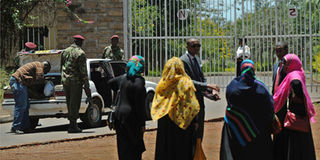Kenya is sliding down a slippery path to lawlessness and anarchy

Kenyan paramilitary officers (L) perform a search on a vehicle at the entrance to the Kasarani football stadium in the Kenyan capital, Nairobi, on April 8, 2014, where people of mainly Somali ethinicity rounded up during a police swoop in the city's Somali district of Eastleigh are being held. Kenyan security forces have rounded up thousands of Somalis or Kenyans of Somali origin, leaving many languishing in a football stadium, amid a major crackdown on suspected Islamists blamed for a string of attacks. The operation, which local media say has involved more than 6,000 men from the police and from the elite General Service Unit, started on April 4 and appeared to have been focussed on Eastleigh, an ethnic Somali-dominated district of the Kenyan capital. The crackdown follows a spate of attacks in Kenya by suspected Islamist and sympathisers of Somalia's Al-Qaeda-linked Shebab rebels. AFP PHOTO/ TONY KARUMBA
What you need to know:
- We are becoming victims of terrorism because of easily corruptible security forces and the fact that our intelligence apparatus is uncoordinated and unmotivated.
- Instead of charging radical Muslim clerics with hate speech and incitement to violence, leaders are issuing shoot-to-kill orders.
Kenya is rapidly becoming a rogue state, and it seems there is nothing that the country’s leadership can do about it. County officials and Cabinet secretaries are issuing orders that violate the Constitution and the laws of the land, yet they are not reprimanded or brought to book.
A few days ago, a county official in Mombasa, who had no authority to do so, ordered police to shoot terror suspects. Last week, the Muslim cleric, Abubakar Shariff “Makaburi”, was killed by unknown gunmen.
Was there a link between the order and the killing?
Last year, a High Court determined that the order to repatriate refugees living in urban areas to refugee camps was unconstitutional. Yet, last month, the Interior Cabinet Secretary decided to ignore the High Court ruling and issued another directive ordering refugees to leave cities.
Does a High Court decision in Kenya mean nothing? Are state officials a law unto themselves?
Which authority is ultimately in charge of national security? Is it the Interior Cabinet Secretary, county security committees, the chiefs of the various security organs or the president?
It is not clear. And this is perhaps why insecurity is spiralling out of control and terrorists have found safe haven here.
Let’s get one thing straight. We are not experiencing increasing terrorist attacks because Somali refugees live among us. We are experiencing terrorist attacks because terrorists can pay as little as Sh500 to a police officer to cross our border.
We are becoming victims of terrorism because of easily corruptible security forces and the fact that our intelligence apparatus is uncoordinated and unmotivated. There seems to be no chain of command or accountability.
The Westgate mall terror attack revealed all the fault lines within the security apparatus, including poor intelligence gathering and downright incompetence. Scapegoating the urban refugees and ordering them to go to camps is not the solution to terrorism. And here is why.
MAKABURI WAS KENYAN
First, many of Al-Shabaab terrorists in Kenya are actually Kenyans with names such as Kariuki and Omondi. “Makaburi”, who the government claims was a terrorist sympathiser, was not Somali; he was Kenyan. Young men are becoming Al-Shabaab on Kenyan soil.
Second, Dadaab, which is already bursting at the seams with nearly half a million refugees, is a pathetic excuse for a refugee camp. Recently, the Wajir South MP warned that the area around the camp was suffering environmental degradation and insecurity.
Neither the UNHCR nor the Kenyan Government have catered to the refugees’ energy needs, with the result that refugees are cutting trees for firewood. Meanwhile, criminal elements among the refugees are terrorising local residents.
For years, we have known that Dadaab is a centre for human trafficking and gun-running, yet neither UNHCR nor the Kenyan authorities have managed to stem these vices; in fact, it is possible that staff of the UN and Kenyan authorities may be complicit in the illegal trading of human beings and small arms.
The deplorable living conditions in Dadaab force many refugees to move to urban centres. Their movement is often aided by Kenyan authorities, who, for a small bribe, allow the refugees to leave the camps.
The bribe-taking continues when they arrive in places like Nairobi’s Somali-dominated Eastleigh area. Ethnic Somalis living in Eastleigh are constantly harassed by police, who are known to extort bribes from refugees. Eastleigh residents have for years claimed that they are arbitrarily arrested and even raped by police officers patrolling the area. Most are released after they part with a hefty bribe.
Three years ago, the International Peace Institute published a shocking report titled “Termites at Work” that showed links between powerful politicians, smugglers, drug barons, corrupt police and immigration officers. The government then decided to ignore the report’s findings.
Now, instead of looking at how this criminal network is impacting on security, the government is looking to blame soft targets such as refugees. And instead of charging radical Muslim clerics with hate speech and incitement to violence, leaders are issuing shoot-to-kill orders.
It’s a slippery slope that can descend into total anarchy and lawlessness.





